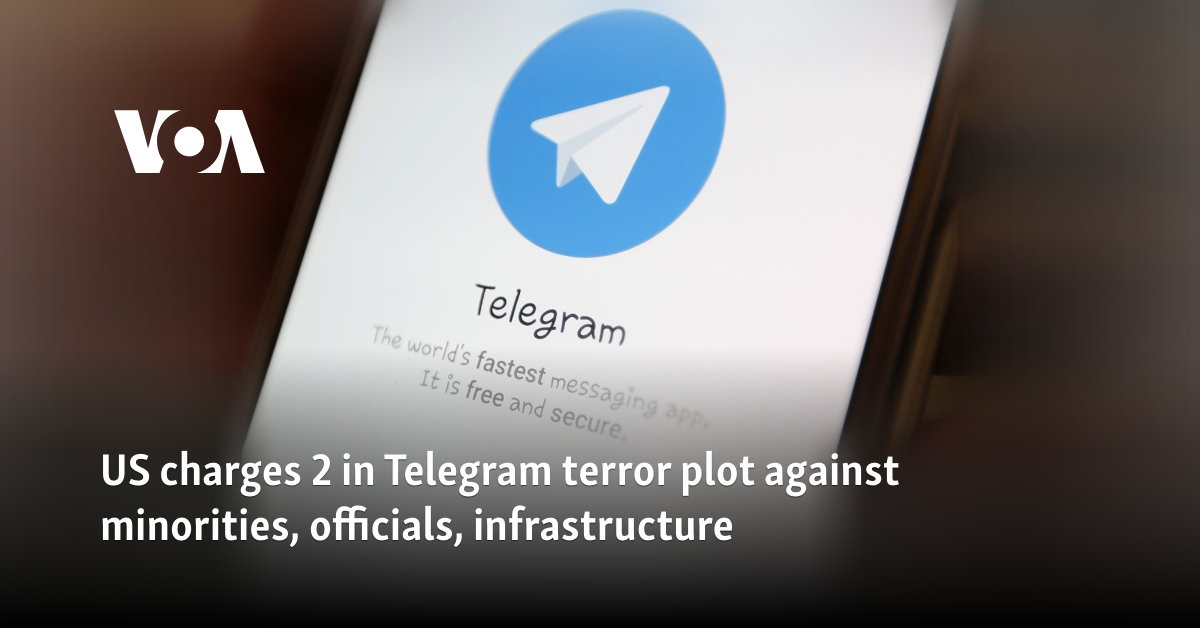Infra
US charges 2 in Telegram terror plot against minorities, officials, infrastructure

Two people who prosecutors say were motivated by white supremacist ideology have been arrested on charges that they used the social media messaging app Telegram to encourage hate crimes and acts of violence against minorities, government officials and critical infrastructure in the United States, the Justice Department said Monday.
The defendants, identified as Dallas Humber and Matthew Allison, face 15 federal counts in the Eastern District of California, including charges that accuse them of soliciting hate crimes and the murder of federal officials, distributing bombmaking instructions and conspiring to provide material support to terrorists.
Humber, 34, of Elk Grove, California, and Allison, 37, of Boise, Idaho were arrested Friday. Humber pleaded not guilty in a Sacramento courtroom Monday to the charges. Her attorney Noa Oren declined to comment on the case Monday afternoon after the arraignment.
It was not immediately clear if Allison had an attorney who could speak on his behalf.
The indictment accuses the two of leading Terrorgram, a network of channels and group chats on Telegram, and of soliciting followers to attack perceived enemies of white people, government buildings, energy facilities and “high-value” targets such as politicians.
“Today’s action makes clear that the department will hold perpetrators accountable, including those who hide behind computer screens, in seeking to carry out bias-motivated violence,” Assistant Attorney General Kristen Clarke, the Justice Department’s top civil rights official, said at a news conference.
The pair’s exhortations to commit violence included statements such as “Take Action Now” and “Do your part,” and users who carried out acts to further white supremacism were told they could become known as “Saints,” prosecutors said.
Justice Department officials say Humber and Allison used the app to transmit bomb-making instructions and to distribute a list of potential targets for assassination — including a federal judge, a senator and a former U.S. attorney — and to celebrate acts or plots from active Terrorgram users.
Those include the stabbing last month of five people outside a mosque in Turkey and the July arrest of an 18-year-old accused of planning to attack an electrical substation to advance white supremacist views. In the Turkey attack, for instance, prosecutors say the culprit on the morning of the stabbing posted in a group chat: “Come see how much humans I can cleanse.”
A 24-minute documentary that the two had produced, “White Terror,” documented and praised some 105 acts of white supremacist violence between 1968 and 2021, according to the indictment.
“The risk and danger they present is extremely serious,” Assistant Attorney General Matthew Olsen, the Justice Department’s top national security official, said of Terrorgram users. He added, “Their reach is as far as the internet because of the platform they’ve created.”
Telegram spokesman Remi Vaughn said: “Calls to violence have no place on Telegram’s platform. Moderators removed several channels that used variations of the ‘Terrorgram’ name when they were discovered years ago. Similar content is banned whenever it appears.”
Telegram is a messaging app that allows for one-on-one conversations, group chats and large “channels” that let people broadcast messages to subscribers. Though broadly used as a messaging tool around the world, Telegram has also drawn scrutiny, including a finding from French investigators that the app has been used by Islamic extremists and drug traffickers.
Telegram’s founder and CEO, Pavel Durov, was detained by French authorities last month on charges of allowing the platform’s use for criminal activity. Durov responded to the charges with a post last week saying he shouldn’t have been targeted personally and by promising to step up efforts to fight criminality on the app.
He wrote that while Telegram is not “some sort of anarchic paradise,” surging numbers of users have “caused growing pains that made it easier for criminals to abuse our platform.”









